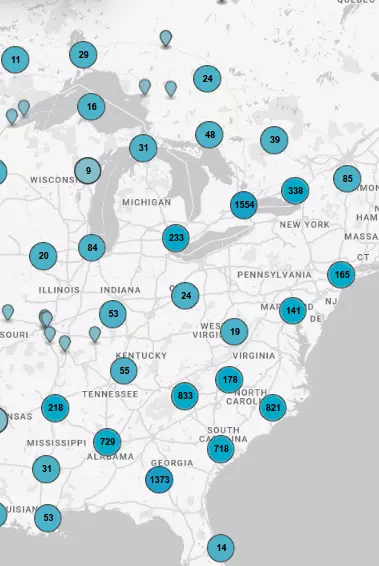Belles Lettres Building
Ca. 1851. Neoclassic Revival. The origin of this structure is uncertain. It is generally assumed to be one of two buildings completed in 1851 for use by a campus literary society. Its architecture...
- mississippi
- education
Old Port Gibson to Rodney Road
This road is the first established route from Port Gibson and Alcorn to Rodney, and was constructed in the early nineteenth century. Composed of loess soil, the old roadbed and roadside bluffs for...
- mississippi
Billy Cannon - 1959 Heisman Memorial Trophy Winner
Dr. Billy Cannon is among the most heralded and identifiable college football players in NCAA history and is largely responsible for the emergence of big-time football at LSU. Cannon, who was born...
- louisiana
- sports
- football
Bourgeois Famille
Dedicated to the memory of our courageous Acadian ancestors who settled this area in the mid 1700's. Once buried here, most of their original graves have been lost to time and the river.Erected...
- louisiana
Camp Moore
One of the principal Louisiana Confederate induction centers and training camps during the war for southern independence. Named for Governor Thomas Overton Moore. Over 400 soldiers buried in the...
- louisiana
- civil war
Antonia Plantation
A typical raised Creole Cottage, Antonia was an early 1800's working sugar plantation. Established through a 1793 Spanish Land Grant claimed by Pierre Lebert. Zephirin Blanchard married...
- louisiana
- plantation
The Old Saint Gabriel Church
In 1699 Pierre Lemoyne, Sieur D'Iberville, father of Louisiana, explored the Mississippi and its distributary the Ascantia, later called Bayou Manchac. By 1758 exiled Acadians had settled...
- louisiana
- church
Battle of Baton Rouge, 1862
On August 3, 1862, Confederate troops from Alabama, Kentucky, Tennessee, Mississippi, and Louisiana under General John C. Breckinridge attacked from the east in an unsuccessful attempt to dislodge...
- louisiana
- civil war
White's Chapel United Methodist Church
Gothic Revival church built in 1894 by Hugh and Lee Evans on land donated by Wilson A. O'Quin, Sr. It was named in honor of Rev. Frederick White who organized it in 1870. Listed on the...
- louisiana
- church
Plaisance School
Plaisance School was built in 1921 at a total cost of $4,500.00. Funds for construction were donated by Julius Rosenwald Fund - $1,200.00; the Plaisance black community - $3,100.00; and the...
- louisiana
- african-american
Fogleman Cemetery - Typical Frontier Cemetery Dating From the Early 1800s
John Fogleman, a native of Virginia, was in this area in 1816, a witness to his sister's wedding in the St. Landry Courthouse. He married Polly Sandefur there Jan. 1, 1819. On Nov. 28, 1853,...
- louisiana
- cemetery
Louisiana Orphan Train Museum
In 2009, a former century old Union Pacific freight depot was restored to become the Louisiana Orphan Train Museum. Opelousas was one of the many railway destinations for thousands of...
- louisiana
Venus House
The Venus House was the first building to be relocated to Le Vieux Village in 1973. This French Creole style home was donated by the Earl Fontenot family. The home was originally located in...
- louisiana
Alcorn Agricultural and Mechanical College
Established May 13, 1871, as Alcorn Univ. of Miss on site of Oakland College. Hiram Revels, first president. Reorganized 1878 and Alcorn A.&M. Oldest land-grant college for Negroes in the United States.
- mississippi
- african-american
- education
Union Church
Settled,1806, by Scotch Presbyterians, whose Gaelic speech long survived. Rev. C.W. Grafton served as minister in area 61 years. Site where Grierson's raid was checked, April 28, 1863.
- mississipi
- church
Laurel Hill Plantation
Ca. 1815. Located almost one mile southwest, Laurel Hill is listed in the National Register of Historic Places. A single approach leads from the primary road one-fourth mile toward Rodney down...
- mississippi
Dr. Rush Nutt - (1781-1837)
Dr. Rush Nutt, who built Laurel Hill Plantation about 1815, is known for his agricultural and scientific study for initiating improvements in agricultural implements and techniques and for...
- mississippi
Old Town of Rodney - Structures
Old Rodney Presbyterian Church, dedicated in 1832, is located north on Commerce Street at Church Street intersection. Also on Commerce Street at the south edge of town is Sacred Heart...
- mississippi
- ghost town
Old Town of Rodney
Incorporated in 1828, Rodney was noted for its high level of culture, county fairs and business activity. Rodney once contained two banks, two newspapers, 500 people and 35 stores....
- mississippi
- ghost town
Old Rodney to Bruinsburg Road
Old early nineteenth century road was one of two connecting the old town of Rodney with Claiborne County settlements. Composed of loess soil, the roadbed and roadside bluffs remain today much...
- mississippi
